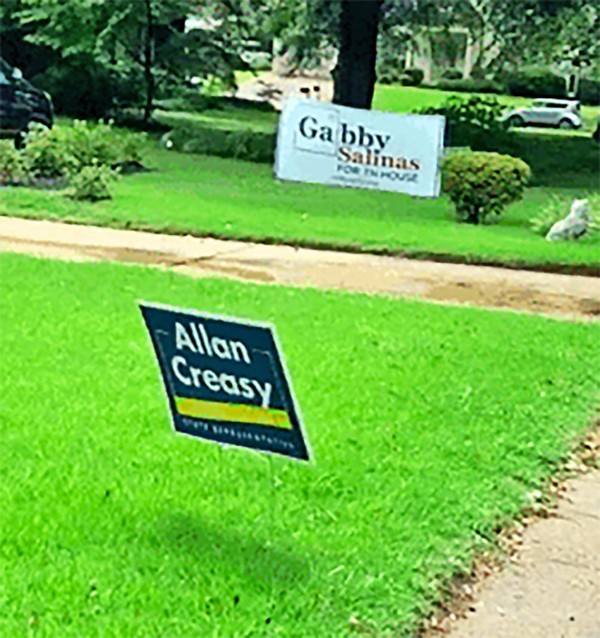With early voting underway as of last Friday (and continuing through August 1st) and election day itself rapidly approaching, requests for mail-in ballots for the August 6th county general election and federal/state primaries are being described, alternatively, as “through the roof” and “spiking.” (To secure a mail-in absentee ballot, you must apply by July 30th; see sidebar.)
The election has been hampered by the continuing coronavirus pandemic, which has made for sporadic and low-key campaigning, and it would, in normal circumstances, be regarded as an anticlimactic way station between the Tennessee presidential primary of last March and the forthcoming presidential election in November.
There are, however, U.S. Senate and Congressional primaries on the local ballot, as well as school board seats, a clerkship, and legislative primaries. And the unusual amount of absentee voting could inflate the final figures beyond expectation.
There have been numerous hitches and obstructive actions by the state or other election authorities in the wake of Nashville Chancellor Ellen Hobbs Lyle‘s June 5th order mandating universal eligibility for absentee ballots during the COVID-19 crisis, but Lyle and attorneys for Memphis’ Up the Vote 901 plaintiffs have persistently pushed them aside. Most recently, as of the weekend, plaintiffs secured a consent order requiring that stickers relating to the COVID circumstances be affixed to an information mailer from the Shelby County Election Commission that had omitted that information.
COUNTY GENERAL ELECTION
The only overtly partisan clash on the August 6th ballot is the battle between former Probate Court Clerk Paul Boyd, a Republican, and Joe Brown, a former long-term member of the Memphis City Council. They’re vying for the office of General Sessions Court Clerk, to succeed the retiring Ed Stanton Jr.
The other main races on the county general election portion of the ballot are nonpartisan ones for five seats on the nine-member Shelby County Schools Board. At stake are the District 2 seat, sought only by incumbent Althea Greene, and the seats for:
District 3 (candidates Jesse Jeff, Aaron Youngblood, and incumbent Stephanie P. Love);
District 4 (Clyde Wayne Pinkston, Tamarques Porter, Kristy Sullivan, and incumbent Kevin Woods);
District 5 (Paul Evelyn Allen, April Grueder, Sheleah Harris, and incumbent Scott McCormick). The name of Mauricio Calvo is on the ballot, too, but he has discontinued his race;
District 6 (Trevor Johnson Banks and incumbent Miska Clay Bibbs)
The only other race on the general election portion of the ballot is one for Collierville Municipal Judge, in which Lee Ann Pafford Dobson is unopposed.
 Jackson Baker
Jackson Baker
U.S. SENATE PRIMARIES
Republican — Former ambassador to Japan and ex-state Economic Development Commissioner Bill Hagerty is supported by President Donald Trump and by numerous members of the Tennessee Republican establishment to fill the seat being vacated by Lamar Alexander. Not unexpectedly, Hagerty has a roughly two-to-one fundraising edge ($4 million cash on hand to $2 million) on GOP challenger “Dr. Manny” Sethi, a Nashville physician who’s hoping to be this year’s Bill Lee, running a conservative campaign as a personable new face and staying just this side of Hagerty’s take-no-prisoners Trumpism.
 Jackson Baker
Jackson Baker
Candidate Sethi with hand-out mask
Multi-millionaire physician and broadcast entrepreneur George Flinn of Memphis is also once again spending liberally from his personal cashbox, but would not appear to be a serious contender.
 Jackson Baker
Jackson Baker
GOP conclave — George Dempsey Summers with candidates Mark White and Patti Possel at Agricenter International
Democratic — Having failed with former Governor Phil Bredesen‘s Senate campaign in 2018, Tennessee Democrats have lower-profile choices this year — James Mackler, the Nashville lawyer and Iraq war vet who dropped out of a 2018 Senate race, deferring to Bredesen; Robin Kimbrough Hayes, a pastor and attorney from Hendersonville; and Marquita Bradshaw, a Memphian who describes herself as an “environmentalist.” Mackler has raised some $2 million in the course of his race; the others in the low thousands.
U.S. CONGRESSIONAL PRIMARIES
9th District: Since winning the 9th District seat in 2006, incumbent Democrat Steve Cohen has ably defended it in every election since, proving by his lopsided margins over a series of African-American challengers that a white candidate can win in this majority-Black district. His main primary challenger this year is Corey Strong, a Navy reservist and former local party chair. Also on the ballot is novelty candidate Leo Awgowhat, whose antics are growing as stale as did those of the all-too-forgettable Prince Mongo.
An interesting wrinkle is that Strong, who as party chairman denounced the pay-for-play sample ballot of political entrepreneur Greg Grant in 2018, this year leads Grant’s “endorsement” ballot. He is also writing op-eds for local media and doing what else he can to get his name out. All the same, Cohen is heavily favored.
One Republican is on the GOP primary ballot: Charlotte Bergman, a perennial.
8th District: David Kustoff, the Republican incumbent since the 2016 election, faces no primary opponents in 2020, having easily disposed of a challenge from the aforementioned Flinn in 2018. Assumed to be on the moderate end of the GOP spectrum during his political rise, which included stints as U.S. attorney and statewide director for George W. Bush in 2000, Kustoff has proved to be otherwise and is one of the stoutest cheerleaders around for Donald Trump and the president’s policies.
Among the Democrats vying for the right to challenge Kustoff are Erika Stotts Pearson of Cordova, the party’s nominee from 2018; former University of Memphis law professor Lawrence A. Pivnick; Hollis W. Skinner, a Vietnam vet and former Trenton alderman; and Savannah Williamson of Jackson, who ran unsuccessfully for the state Senate in 2018.
 Jackson Baker
Jackson Baker
Masked men (and Republicans at that!) — U.S. Rep. David Kustoff and U.S. Senate aspirant George Flinn at GOP Headquarters opening
LEGISLATIVE RACES
State House — District 83: This ethnically changing southeastern Shelby County enclave, including parts of Memphis, unincorporated Shelby County, and Germantown, has been targeted by Shelby County Democrats as the next district (after adjoining District 96) to throw off Republican domination. There are no primaries, as both parties have already settled on their candidates — incumbent state Rep. Mark White for the GOP and challenger Jerri Green for the Democrats. Their battle is in November, and it promises to be tight.
District 84: No Republicans are competing for this seat, embodied in a district that stretches ribbon-like from Oakhaven to Hickory Hill across the southern rim of Shelby County. Incumbent Democrat Joe Towns is always under challenge, both from the state Election Registry, where fines for his late filings and disclosures have accrued, and from this or that opponent.
His latest adversary is Dominique Primer, a civic activist, political newcomer, and proprietor of a swimming school.
District 85 sees another situation with no Republicans and two Democratic contestants. They are first-term incumbent Jesse Chism and challenger Alvin Crook, a former local Young Democrats president. Chism is not yet fully embedded via longevity, but he has a supportive network, and Crook is still trying to make his mark.
District 86 has been represented for many years by Barbara Cooper, a hardy and well-liked nonagenarian, and her three challengers — Austin A. Crowder, Dominique Frost, and JoAnn Wooten-Lewis — have their work cut out for them. So does Rob White, a political unknown who will be running as a Republican in November.
District 87 is the domain of the current Democratic House Leader, Karen Camper, and, for good and obvious reasons, no one of either party dared to venture out against her.
District 88 has a thoroughly ensconced Democratic incumbent, too: Larry J. Miller, who is well-prepared to withstand a challenge from one Orrden W. Williams Jr. No Republicans in this one, either.
District 90 is an open seat, for the unusual reason that the longtime incumbent, John DeBerry, was denied his party’s bona fides earlier this year by the state Democratic Committee, a majority of whose members thereby expressed their impatience with DeBerry’s close relationship with legislative Republicans and affinity for GOP issues.
Three Democrats are vying for the party label and the right to oppose DeBerry, who — thanks to a special legislative bill on his behalf — is running as an independent, in November. The Democrats are Torrey Harris, Anya Parker, and Catrina L. Smith, all of whom have sources of support and viable campaigns.
Districts 91 and 93 are both cases in which a single Democrat is running unopposed, with no Republican entrants in the GOP primary. The candidates are, respectively, London Lamar and G.A. Hardaway. Both are incumbents.
District 95 is held down by Republican incumbent Kevin Vaughan of Collierville, whose opponent in November will be Democrat Lynette Williams.
District 96 bridges portions of Memphis, unincorporated Shelby County, and Germantown, and two-term Democratic incumbent Dwayne Thompson took the seat away from a Republican incumbent in 2016 and successfully defended it in 2018 against Republican nominee Scott McCormick. Patti Possel, a noted de-annexation activist, lost the Republican primary that year but is unopposed this time and will try to regain the seat for the GOP.
District 97, another suburban bridge district, lies just to the north, stretching from Cordova through Bartlett almost all the way east to the Fayette County line. The retirement of veteran GOP incumbent Jim Coley makes it a heady temptation for Democrats, and four of them — all with respectable credentials — are vying for it.
 Jackson Baker
Jackson Baker
Showtime — House candidates Ruby Powell-Dennis, Clifford Stockton III, and Allan Creasy at forum with moderator Steve Mulroy
They are: Allan Creasy, the Celtic Crossing bartender and activist who ran for the seat in 2018, came reasonably close, and never quite stopped running; Gabby Salinas, the scientific researcher and cancer survivor via St. Jude who came within a hair two years ago of upsetting GOP state Senator Brian Kelsey; Ruby Powell-Dennis, a veteran educational administrator and director of the New Memphis nonprofit; and Clifford Stockton III, also an educational administrator and scion of a well-respected Memphis family, whose grandfather was a mainstay of the Chamber of Commerce.

When neighbors disagree
All have robust campaigns, though Salinas and Creasy and Powell-Dennis are leaders in fundraising.
The Republicans are not surrendering the seat without a fight, and they, too, have a competitive primary. One candidate is John Gillespie, who has a background in both banking and Republican politics and is grant coordinator at Trezevant Episcopal Home. Gillespie has a considerable lead both financially and in establishment support over Brandon Weise, an employee of the Shelby County Register’s office.
In District 98, incumbent Democrat Antonio Parkinson has an opponent, one Charles A. Thompson, but as a preeminent broker in his Frayser/Raleigh bailiwick, Parkinson would seem secure. No Republican seeks the seat.
District 99, which comprises much of the northern and eastern parts of Shelby County, including Millington and Arlington, is the site of a Republican grudge match featuring incumbent Tom Leatherwood and former county Republican chair Lee Mills. Both had sought to be appointed to the seat after the death of its late incumbent, Ron Lollar, in 2018. Leatherwood got the nod from the GOP steering committee then, but Mills grew determined to put Leatherwood out to pasture.
Whether it was the intervention of the prolonged COVID break or some other cause, however, Mills’ momentum, rising in March, was broken and never fully repaired. Leatherwood’s fundraising has dwarfed Mills’, and the incumbent seems well-buffeted against the challenge.
State Senate
Two Senate seats are on the August 6th ballot, those in Districts 30 and 32. District 30 takes in much of the western half of the county and, unsurprisingly, is largely Democratic. The only race there is between incumbent Democrat Sara Kyle and primary challenger M. Latroy Alexandria-Williams, a perennial candidate and pay-for-play ballot proprietor who was disallowed the Democratic label for a District 9 race by the party’s state executive committee back in April but somehow reacquired it for his state Senate try. He’s still probably whistling in the dark, however.
District 32, which is split between eastern Shelby County and Tipton County, has a Republican race, pitting political newcomer Scott Throckmorton versus incumbent Paul Rose of Covington, who is so well-regarded that he outpolled several well-known Shelby Republicans to win the seat, formerly held by U.S. Judge Mark Norris, in a special election in March.
Applying for an Absentee Ballot
The Tennessee secretary of state’s office has been anything but receptive to the case for allowing universal absentee-ballot eligibility during the ongoing pandemic, but a judge has ordered it, and they — as well as election offices throughout the state — must comply. Their website, however, buries the necessary information about eligibility in a thicket of confusing prose. The salient point is that, as Chancellor Ellen Hobbs Lyle has decreed, any eligible Tennessee voter who wishes to vote by absentee ballot on grounds of their concerns about COVID-19 may do so. Period.
The Secretary of State’s website is relatively forthcoming, however, and very detailed about the method of applying:
“You must submit a written request containing the information below to your local county election commission office by the seventh day before Election Day. [July 30th, in the case of the August 6 election] You can use the absentee ballot request form to make sure all required information is provided.
“You can submit your written request for an absentee ballot by mail, fax, or e-mail. If e-mailing your request, be sure the attached document contains the information below and your scanned signature.
1. Name of the registered voter
2. Address of the voter’s residence
3. Voter’s social security number
4. Voter’s date of birth
5. Address to mail the ballot
6. The election in which the voter wishes to participate. If the election involves a primary, the political party in which the voter wishes to participate.
7. Reason the voter wishes to vote absentee
8. Voter’s signature
A request that contains this information will be processed and a ballot will be mailed to the voter.”